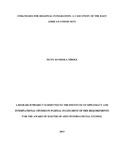| dc.description.abstract | Until today, African integration has proved to be a major challenge. Since 1967 when the Permanent Tripartite Commission for East African Co-operation was first formed East African integration has proved to be a major challenge. Why until today, the year 2013 have the involved member states not been able to establish integration? The East African Community operates on a five year development strategy that spells out the priority programmes, implementation schedules and policy guidelines. The establishment of an internationally competitive single market and investment area in East Africa is accorded priority alongside the development of regional infrastructure, human resource, science and technology. The main objective of the study was to examine the various strategies used for regional integration and their impact on enhancing the EAC integration agenda. The research focuses in particular at the East African Community as a case study. Specific objectives of the study were to discuss the democratization as a strategy for East African Community integration process; to establish the level of military integration as a strategy for East African Integration; and to examine economic diplomacy as a strategy for East African integration. The study looked into the theoretical integration arguments as argued in neo-functionalism and intergovernmentalism and Liberal Intergovernmentalism. The study adopted desk research design. The target population was Co-ordinating and Sectoral Committees, and the organs of the Ministry of East African Community, Kenya. Data was collected through available information in print or published on the internet materials. The study found out that democracy is critical in the achievement of sustainable economic growth and development and the community is working towards greater democratic environment. It found out that the greatest hindrance to democratic consolidation in EAC is the perennial conflicts within the horn of Africa and the great lakes region, terrorism and piracy threats including the proliferation of small arms and influx of refugees into the region. It further found out that Interest rates in the region have remained almost constant and above the inflation rates for the period 2006 to 2010, confirming that securing credit for investment is prohibitive in the region. The study found out that Kenya’s, Tanzania’s and Uganda’s HD declined from Medium to low HD. Rwanda’s and Burundi’s HD although low throughout 2006 to 2010 have also been experiencing declining trends. It found out that Uganda and Tanzania remains the preferred destination of FDI attraction in the region. There is a decline in Kenya’s trade as compared to other member countries where the countries trade declined by about US $109.2 million in the year 2006 while substantial declines were recorded in 2009 and 2010 indicating substantial imports. The study finally found out that poverty levels are very high, with close to half the population in the region living below the poverty line. The study recommended that there is need for developing a legislative framework (laws, policies and guidelines) for Community Development within partner states. It recommended for the harmonisation of democratization policies, processes and practices. It further recommended that there is need to identify institutional bottlenecks that infringe on the rights of the poor and marginalized to access social services and empower them to participate in Community Development. It finally recommended for the monitoring and observation of elections and support missions to National Electoral Commissions in the EAC Partner States. | en |

